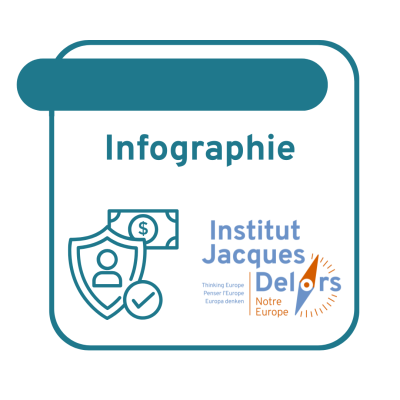[EN] Cartographie du commerce numérique de l’UE
Un leader mondial caché à la vue de tous?

La pandémie a déplacé notre travail et notre vie en ligne et accéléré la transition de l’Union européenne vers une économie numérique. Des enquêtes montrent que jusqu’à trois quarts des employés européens souhaiteraient continuer à télétravailler à l’avenir. Les réseaux numériques fournissent des vidéos aux 141 millions d’Européens qui sont abonnés à des services de streaming pour se divertir. De plus, le volume de biens physiques commandés en ligne par les entreprises et les consommateurs a augmenté de 58 % rien qu’en 2020. Ces évolutions modifient profondément la structure de l’économie européenne et sont devenues des moteurs importants de la productivité. Dans le même temps, le centre de l’économie mondiale se déplace vers l’est. La Commission européenne estime que 85 % de la croissance économique future aura lieu en dehors de l’UE, et qu’une grande partie de celle-ci concernera le secteur numérique. Il est donc essentiel que l’UE se connecte aux marchés de l’avenir, afin que l’Europe reste à la pointe de la transformation numérique.
Selon une opinion largement répandue, l’UE tente actuellement de compenser les lacunes de son économie numérique par une réglementation excessive à l’encontre de la concurrence étrangère. Le président français Emmanuel Macron a résumé cette situation difficile lorsqu’il a écrit en 2020 que les États-Unis ont le GAFA (en référence à Google, Apple, Facebook et Amazon) et la Chine le BATX (en référence à Baidu, Alibaba, Tencent et Xiaomi), mais que l’UE n’a que le RGPD (en référence au règlement général sur la protection des données). Bien que l’Europe ne compte que quelques grandes entreprises technologiques dont la capitalisation boursière se rapproche de celle des plus grandes plateformes américaines et chinoises, ce discours pourrait en même temps sous-estimer une force importante qui est cachée à la vue de tous : le rôle central de l’UE dans le régime commercial numérique émergent en tant que premier exportateur et importateur mondial de services numériques et acteur clé dans le domaine réglementaire en plein essor du commerce numérique.
En fait, comme le montrent les données de l’analyse ci-dessous, l’UE exporte et importe plus de services numériques que d’autres grandes économies, telles que les États-Unis, la Chine ou l’Inde. D’une part, cela signifie que l’UE doit protéger les intérêts de ses entreprises en matière d’accès au marché, et peut-être le faire de manière plus agressive que par le passé. D’autre part, son rôle de premier plan en tant qu’importateur de services numériques peut aider à expliquer « l’effet Bruxelles » dans l’économie numérique mondiale.
Avec ses récentes réglementations en matière de confidentialité, de plateformes, de concurrence et de données, l’UE a répondu aux exigences fonctionnelles qui découlent d’une économie numérique mondialement intégrée, qui s’est développée autour d’un internet largement autorégulé. L’absence de règles a permis une croissance et un développement rapides, mais elle a également soulevé des questions quant au rôle approprié des pouvoirs publics, car le transfert de données au-delà des frontières internationales crée des externalités et des lacunes réglementaires. Les consommateurs, par exemple, s’inquiètent pour leur vie privée lorsque leurs données personnelles sont stockées en dehors de leur juridiction. Les entreprises doivent faire face à des obstacles à l’accès au marché numérique lorsqu’elles tentent de vendre leurs biens et services au-delà des frontières. La politique commerciale de l’UE n’est pas un nouvel outil pour combler ces lacunes. L’UE a donc inclus des dispositions relatives au commerce numérique dans ses accords commerciaux dès 2001 et dans un total de vingt-quatre accords à ce jour, élargissant continuellement leur portée et leur ampleur au fil des ans. La révision de la politique commerciale de l’UE de 2021, qui guide l’agenda commercial européen actuel, reconnaît également le rôle de la politique commerciale dans l’économie numérique :
« La transformation numérique est un facteur clé du développement durable, mais aussi un espace de concurrence et de gouvernance multilatérale inadéquate. Alors que l’Europe s’engage dans sa décennie numérique, le soutien à la transformation numérique de l’Europe est une priorité tant dans les politiques internes qu’externes, y compris la politique commerciale et les instruments commerciaux. »
Cela indique que la politique commerciale de l’UE continuera à s’intéresser de plus en plus aux transactions transfrontalières dans le domaine numérique, qui peuvent être regroupées sous le paradigme émergent du « commerce numérique ».
Les discussions autour du commerce numérique ont vu le jour au début des années 2010 à partir du programme non contraignant de gouvernance de l’internet et du programme de travail sur le commerce électronique de l’OMC, longtemps en sommeil, et ont connu des progrès rapides ces dernières années. Malgré cela, les décideurs politiques ont encore une compréhension quelque peu floue du commerce numérique, tant en termes de définition que de mesure. Alors que la Commission européenne commence à prendre plus au sérieux la nécessité d’une stratégie en matière de commerce numérique, les États membres doivent rapidement améliorer leur compréhension des atouts de l’Europe dans ce domaine et de la manière de les utiliser comme levier pour promouvoir son modèle réglementaire pour l’économie numérique.
Le présent document d’orientation contribue au débat en cours en tentant de cartographier l’ampleur et l’orientation du commerce numérique de l’Union européenne et en analysant les efforts récemment déployés par l’Europe pour réglementer les flux numériques transfrontaliers dans les accords commerciaux et une nouvelle génération de partenariats numériques.




